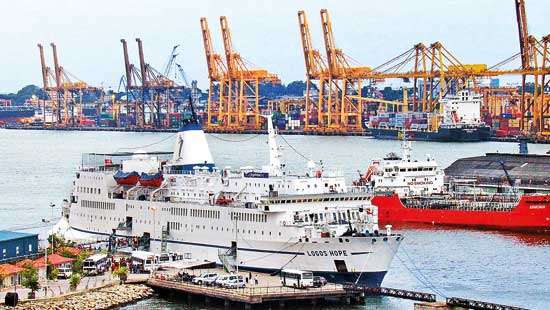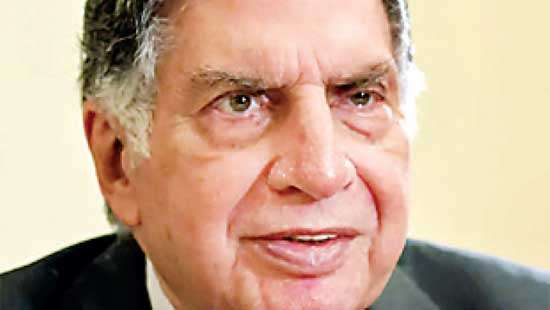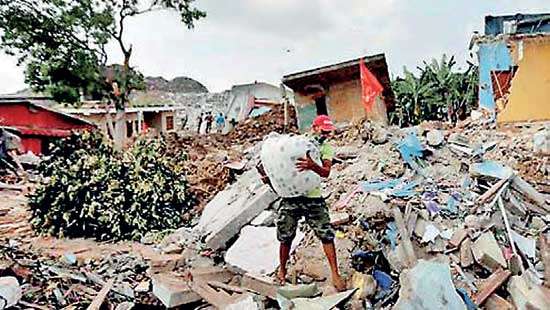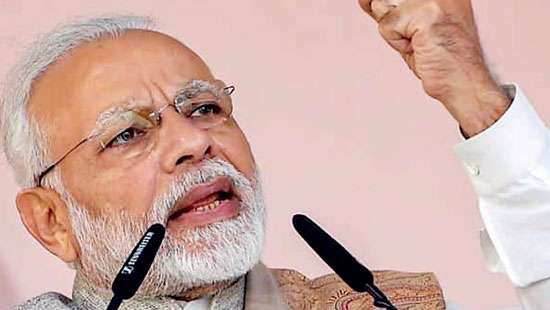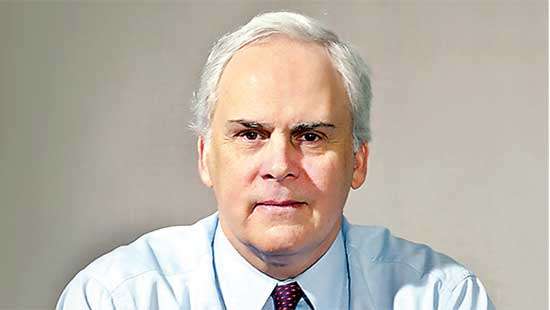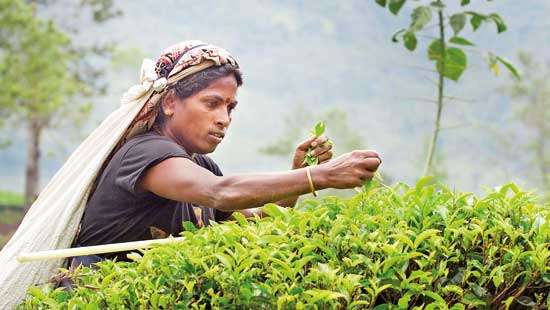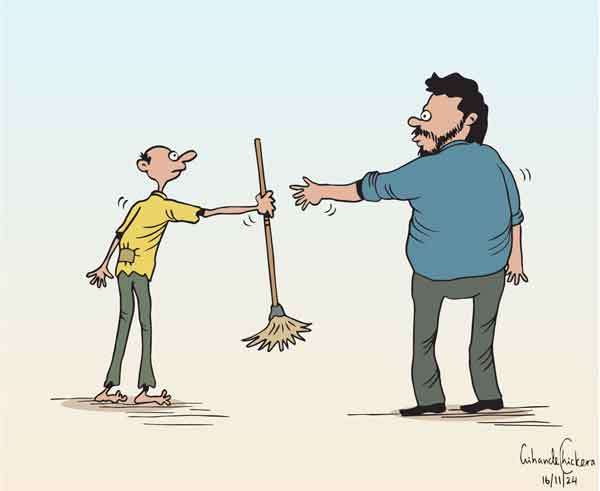Features
Succeeding in 4IR era: Opportunities and challenges for Sri Lanka
02 Apr 2019
 0
0
The Institute of Policy Studies’ (IPS) New Thinkers Symposium saw researchers from several think tanks presenting their work on broad topics under the theme of technology and economic transformation. They highlighted the need for dynamic and innovative thinking to succeed in the era of the Fourth Industrial Revolution (4IR) in the areas of agriculture, megatrends, social security, trade and e-governance.
Dangerous rail travel by tourists – Is there an opportunity?
27 Mar 2019
 0
0
Of late, there has been much debate and concern voiced about tourists standing at the doorways of trains and even hanging out, while the train is moving. Some pictures of a young couple hanging out of a train, while clutching on to the side rails, went viral on social media with debates of the ‘pros’ and ‘cons’ reaching fever pitch.
Sri Lanka FTA debate: What have we gained and what can we achieve?
18 Mar 2019
 2
2
The government of Sri Lanka has embraced Free Trade Agreements (FTAs) as a key focus of the national trade and development strategy. The rationale of this policy choice has been intenselydebated in the Sri Lankan policy circles. The debate has reached a new height following the release of the report of the Committee of Experts (CoE) appointed by the President to evaluate the Sri Lanka–Singapore free trade agreement. The purpose of this article i
Ratan Tata transformed his 19th century businesses to fit-in the digital age
18 Mar 2019
 0
0
Ratan Naval Tata, (born 28 December 1937) is an Indian industrialist, investor, philanthropist, and a former chairman of Tata Sons. He was also chairman of Tata Group, from 1991 to 2012, and again, as interim chairman, from October 2016 through February 2017, and continues to head its charitable trusts.
Linking disaster risk management into economic policy planning in Sri Lanka
14 Mar 2019
 0
0
As several districts in Sri Lanka continue to recover from the prolonged drought last year, recurring floods and landslides hamper economic activities in the country. Sri Lanka was ranked as the second most affected country by the impacts of weather-related losses in 2017, according to the Global Climate Risk Index 2019.
How India’s economy has fared under Modi
13 Mar 2019
 0
0
When Narendra Modi became Prime Minister in May 2014, his Bharatiya Janata Party formed India’s first majority government in almost 30 years. Modi’s tenure ends in May 2019. By then, elections involving more than 900 million people will have chosen 543 members of the lower house of the Indian Parliament and, therefore, a new government. This will be the biggest electoral exercise in the world.
What ails tea industry and what can be done to boost tea export revenue?
05 Mar 2019
 0
0
The note under reference hopefully will help the government to boost exports out of Sri Lanka and formulate policies for potential sectors to collectively go beyond a US $ 25 billion export economy and perhaps retain a surplus after debt redemption in the national budget and free ourselves from the international loan sharks, who come as guardian angels.
Regulating foreign workers now a top priority
27 Feb 2019
 0
0
Sri Lanka is today facing a domestic labour shortage in some key sectors and industries. Demographic issues, social attitudes, expansion of the economy and outward labour emigration are contributing to the shortfall. Generally, the lack of interest in certain types of jobs, low salaries and benefits, lack of qualified people and poor terms and conditions contribute to this overall shortage. Labour shortages
Migration in Asia: Where is everybody going?
14 Feb 2019
 0
0
The US government recently endured a month-long partial shutdown due to a partisan dispute over funding to build a wall on the country’s southern border with Mexico. While those on both sides of the issue were digging in their heels, I got to thinking about migration trends in Asia.
Understanding how central banks manage foreign exchange reserves
12 Feb 2019
 0
0
Global foreign exchange reserves—which are used by countries to pay for goods and services and to hedge against exchange rate risks—reached US $ 11.48 trillion in the second quarter of 2018, according to the International Monetary Fund (IMF).
India bides its time in Indian Ocean
12 Feb 2019
 0
0
New Delhi’s strategic circles are abuzz with speculation of a defence infrastructure upgrade at India’s Andaman and Nicobar islands in the Bay of Bengal. According to media reports, the government is on the cusp of finalising a 10-year plan to create additional infrastructure for troops, warships, aircraft and drones on the islands. This follows news that the Indian navy has commissioned a third naval aviation base on the islands. &nb
Sena attacks on local agriculture and vision of the stupid
06 Feb 2019
 0
0
The first ‘Sena attack’, carried out unwittingly and in good faith, began soon after the ‘Yahapalana’ government came into being in 2015 and under the much hyped slogan of Toxin-Free Nation. The second was the banning of glyphosate, with similar stupid science behind it as for the first but evidently the most damaging of the three, economically.
Sri Lanka’s political problems imperil a fragile economy
30 Jan 2019
 0
0
Sri Lanka plunged into a political crisis in October 2018 when President Maithripala Sirisena suddenly and unexpectedly sacked the sitting prime minister Ranil Wickremesinghe, his former partner in the National Unity Government formed in January 2015. It could not have come at a worse time for the Sri Lankan economy. In a peculiar turn of events,
Need for smoother school-to-work transitions
24 Jan 2019
 0
0
The world stands on the brink of a fourth industrial revolution, where dramatic changes in technological advancements will have profound impacts on the future employment landscape and skill requirements. This means that engaging in lifelong learning—be it at school or at work—to anticipate and prepare for future labour market demands is of paramount importance.
Ten Year Challenge: Has SL made progress in last decade to become a financially literate nation?
24 Jan 2019
 0
0
The ‘10 Year Challenge’, Facebook’s latest social media phenomenon, has taken the Internet by a storm. People are posting a picture from 10 years ago alongside their current profile picture or some other photograph and the transformation through the decade is remarkable. True, people have changed quite a lot over the last 10 years; not only people but countries also have advanced, developed and diversified.
Managing Sri Lanka-China economic relations: BRI, debt and diplomacy
23 Jan 2019
 0
0
China holds approximately 9 percent of Sri Lanka’s total outstanding debt as of 2017 and 14 percent amongst bilateral lenders – equivalent to the same share held by neighbouring India. Despite this, Sri Lanka’s engagement with China has become synonymous globally with the Asian giant’s so-called ‘debt diplomacy’ – an euphemism for debt entrapment.
Bracing for climate change – A matter of survival for the Maldives
22 Jan 2019
 0
0
For low-lying island states, the impacts of global warming and climate change can be a matter of survival. The irony is that while these states have not contributed much to greenhouse emissions, as they produce very little, they may face some of the worst consequences.
Patterns to politics: Entering 2019
22 Jan 2019
 0
0
In the new year, Sri Lanka remains at a crossroads. As before, the island nation requires carefully calibrated statecraft from policymakers to choose the path towards prosperity. The political, constitutional and parliamentary crisis over the last months of 2018 was a waste of time. Possibly, the president never was fully in control of the crisis-riddled turbulent political alliance strategized by him.
Trade war bad news for South Asia
17 Jan 2019
 0
0
The ongoing tariff war between the United States and China will have far-reaching consequences for the trade relations of other countries. Even South Asia — one of the world’s least economically integrated regions with relatively less presence in global value chains compared to East and Southeast Asia — will be affected. While the bilateral dispute may create some economic opportunities for South Asia, they will be outweighed by
Ailing rupee and price controls may lead to milk powder shortage
17 Jan 2019
 0
0
A cup of tea is every Sri Lankan’s morning mantra. This might not be the case much longer as Sri Lanka may face a shortage of milk powder as several leading milk powder importers are reported to have taken a collective decision to suspend imports.
Women in times of disaster: Gender dimension of disaster management in Sri Lanka
16 Jan 2019
 0
0
Owing to climate change, natural disasters have become an almost commonplace occurrence in the world. Developing countries, especially island nations like Sri Lanka, are particularly prone to such disasters, due to two reasons: their geographical location, which is vulnerable to the rising sea levels and their limited capacity to adapt, due to the lack of access to financial resources and technologies.
Symbolic power of Rajapaksa brand
09 Jan 2019
 1
1
In 1996, a punishing drought crippled hydroelectricity generation and impacted households and industry with gruelling eight-hour blackouts. Thousands of farmers faced crop failure and bankruptcy as Chandrika Kumaratunga limped along without plan or purpose. “Her goals are impeccable but her execution seems faulty,” said the roving American journalist Ro
Appointing of chairman and directors to public institutions
08 Jan 2019
 0
0
To improve SOEs’ performance and following many controversial appointments to State-owned enterprises in the past, President Maithripala Sirisena has issued fresh instructions on selection criteria in a bid to eliminate controversial and poorly qualified candidates.

Fonterra to proceed with sale process for Consumer businesses
08 Jan 2019
 0
0

BOI signs US$ 12.16mn deal with Celogen Lanka
08 Jan 2019
 0
0

Nissan to lay off thousands of workers as sales drop
08 Jan 2019
 0
0

EU Ambassador meets new BOI Chief to discuss economic ties
08 Jan 2019
 0
0

SLCERT warns WhatsApp users against sharing OTPs to prevent hacking
08 Jan 2019
 0
0

A clean sweep for NPP
08 Jan 2019
 0
0

Thai woman smuggling Kush on election night stopped at BIA
08 Jan 2019
 0
0

NPP’s attractive policies weaned people away from other parties: SJB
08 Jan 2019
 0
0




